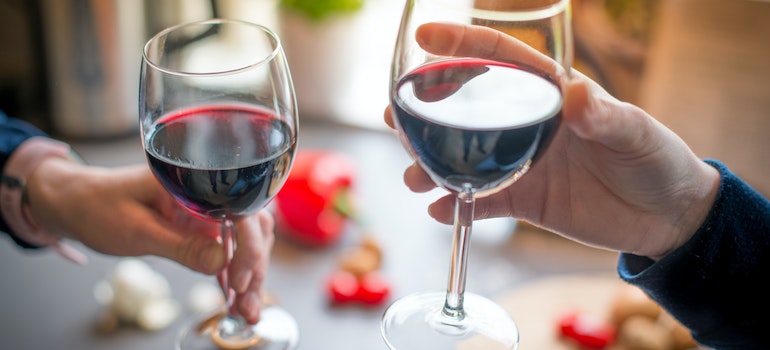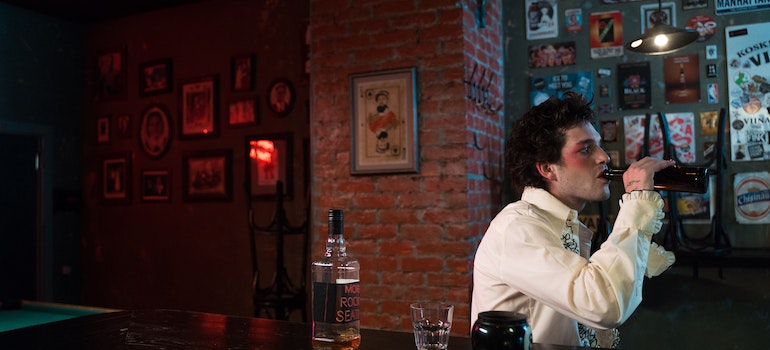Despite addiction, and especially alcohol addiction, being a widespread problem in the United States (almost as common as green eyes, in fact), many people still don’t know much about what it really is or how one can recover from it. A lot of outdated information and misconceptions are still being circulated as facts. This misinformation often reinforces the societal stigma that continues to surround addiction, which can, in turn, deter addicts from seeking help at Harmony Ridge Recovery Center WV. So today, we’re busting the 10 most common myths of alcohol relapse because you deserve to have the correct information about the struggles you or your loved one might be facing. Some of this information may surprise you, some of it may encourage you, and some of it may be difficult to learn; but all of it will help you understand alcohol addiction and relapse better.
Alcohol addiction and alcohol relapse – quick facts and statistics
Almost 21 million Americans struggle with substance abuse; 14 million or two-thirds of those are addicted to alcohol. This makes alcohol the most commonly abused substance in the US. Around 88,000 people die of alcohol-related causes every year, with an average of 30 Americans becoming victims of drunk driving daily. Young men between the ages of 18 and 25 are the most at risk of developing an addiction. And yet, only around 7% of alcoholics go to alcohol rehab in WV. Because alcohol is both legal and socially acceptable to consume (even in excess sometimes), recognizing an addiction to it can be tricky. Many people will ignore the initial warning signs and won’t realize they have a problem until it is serious.

What is a relapse?
When you are in addiction recovery, you are typically expected to commit to full sobriety, at least for a while. This means not using alcohol or any other addictive substances. While some are eventually able to drink again in moderation, the majority of people who suffer from alcohol abuse disorder are advised to maintain their sobriety. A person who starts abusing alcohol (or other substances) after a period of sobriety is said to have relapsed. Relapse is fairly common among addicts – up to 70% of alcoholics will relapse at some point; a third of all people in alcohol addiction recovery will do so within a year.
Common myths of alcohol relapse
Despite it being commonplace, there are still many myths of alcohol relapse. Addicts and non-addicts alike harbor misconceptions about what relapse is, how it starts, and what to do after it happens. This makes it harder to prevent relapse, recognize the warning signs, and even seek help, as many alcoholics feel like they’ve failed if they need to look for an alcohol rehab near Athens OH more than once. But debunking misinformation about alcohol relapse and learning more about it can help mitigate the issue. While you may still relapse even when you know what to expect, you will be better prepared to deal with it.
#1: Relapse is inevitable
One of the by far most common myths of alcohol relapse is that relapse will eventually happen, and you should simply accept that fact. Many people go through rehab fully expecting to relapse after it because they think of relapse as just a step in the recovery process. But this may, in fact, be a self-fulfilling prophecy. If you believe you are doomed to relapse no matter what and are just biding your time until it happens, you are less likely to work on preventing that relapse; and of course, the less you invest in relapse prevention, the less likely you are to prevent relapse.

The truth
While it is true that recovery is not always linear, relapse is by no means an inevitability. Even by the most conservative estimates, 3 in 10 alcoholics will successfully maintain sobriety once it is achieved. The likelihood of this increases the longer you have been sober, so if you can make it through the first few years, you will probably make it in general. With a good relapse prevention plan that includes continued therapy, support from loved ones, and controlling for risk factors like stress and exposure to triggers, it is not just possible but likely that you can maintain your sobriety long-term.
#2: Relapse is a failure
People who relapse often feel like they’ve somehow failed at recovery. They’re sometimes under the impression that rehab has cured their addiction and that they won’t need any more help once they’ve achieved sobriety. So if they can’t maintain it, it’s their own personal failings that are the problem.
The truth
It is important to remember that alcohol addiction is a chronic disease. Even with medication-assisted treatment and therapy, there is no cure for it – you are simply managing it. Some days are going to be tougher than others. And while it is certainly possible to avoid relapse (and many people do), it’s also understandable that some people won’t. You may have received insufficient or subpar treatment in your rehab, you may encounter too many triggers in your daily life, or you may have an addictive personality or a genetic predisposition to alcoholism; all of these factors are entirely out of your control yet will increase the risk of relapse.
So don’t think of relapse as a personal failure. Think of it as a step back in your journey. Look for a better alcohol rehab near Buckhannon WV, and seek help. With time, dedication, and proper support, you can reach your recovery goals and learn to manage your drinking urges even after a relapse.
#3: Alcohol relapse starts with the first sip of alcohol you take
One of the very common yet very dangerous myths of alcohol relapse is that you haven’t really relapsed until you’ve taken a drink. While this is technically true, it’s the wrong way to think about alcohol addiction because alcoholism is not just out-of-control drinking – it’s all the mental, emotional, and behavioral issues that come with it too.
The truth
In reality, there are usually signs that someone is heading for relapse long before they actually start drinking. These may include changes in mood or behavior, such as:
- mood swings
- increased anxiety and depression
- meltdowns due to stress
- isolating from friends and family
- issues at work or in school (unexplained absences, declining performance, interpersonal problems, etc.)
- sleep disturbances (insomnia, excessive sleep, or nightmares)
- a loss of interest in hobbies
- erratic and reckless behavior, often with little to no thought of potential consequences
- expressing thoughts of drinking, doing drugs, self-harm, and even suicide
If you notice these changes in yourself or someone you know, you should seek help. These are all signs that a person is struggling and on the verge of turning to substances again. If they’re not already drinking again, they might start soon. But if they can get help before that happens, then a full-blown relapse can still be avoided.
#4: A few drinks don’t count as an alcohol relapse
Some people have a very specific idea of what relapse looks like. They may be under the misguided impression that until they’ve reached the same level of dependence as before (or worse), they haven’t really relapsed. However, that’s not really true. There are different types and levels of severity when it comes to alcohol relapse, but even one drink is typically considered a problem.

The truth
The majority of recovering alcoholics aim to stay fully sober and not drink again after rehab. For those who define their sobriety in this way, even one drink is a relapse. This doesn’t necessarily mean you will need to commit to an extensive inpatient program at an alcohol rehab center near Clarksburg WV; some relapses are short-term or even unintentional (if, for example, you’re out partying and your drink is spiked). However, they are still a relapse. This means that they can trigger some of the physical symptoms of addiction, like withdrawal or cravings. So don’t take them lightly and seek help if you suspect you need it.
#5: It’s not alcohol relapse if you’re using a different substance
There’s a certain logic to thinking that someone in recovery from alcohol addiction is only relapsing if they turn to alcohol again. However, relapse is less about the substance and more about the addiction. So when you are in alcohol addiction recovery, becoming addicted to a different substance is still considered a relapse.
The truth
Think about it this way: you wouldn’t be looking for an alcohol rehab center close to Point Pleasant WV, if your problem was alcohol; it’s the addiction to alcohol that you need treatment for. By the same logic, your recovery is primarily about addiction. So any addiction, even if it’s not to alcohol this time, would set you back. Understanding that any substance abuse is relapse is particularly important for alcoholics because alcohol is often a gateway drug to abusing prescription medication and opioids. If you have a history of alcohol addiction, you should be especially mindful of using substances with similar effects because this, too, is a form of relapse.
#6: Once you relapse, you have to start over
One of the most prevalent myths of alcohol relapse is that when you relapse, you basically go back to the start. Your streak of sober days goes back to zero, and you have to start from scratch. If you go into rehab again, it’ll basically be like you’ve never had any treatment before.

The truth
Relapse comes after addiction and rehab, but it doesn’t erase them. In fact, your history with substance abuse, treatment, and sobriety is very relevant to your relapse. So once you’ve had those experiences, you are never starting from a blank slate again. If you’re measuring your sobriety by the number of consecutive days without drinking, then this aspect of your recovery will reset, and you’ll start over. But that’s all!
As a relapsed alcoholic, you already have some knowledge about addiction and recovery. When you start treatment in an alcohol rehab center around Fairmont WV again, you’ll already have some understanding of how treatment works and what’s effective or ineffective in your case. Furthermore, your history will inform your treatment plan, as addiction experts always take into account previous relapses. Your recovery this time around may be easier due to previous experience, or it may be harder if relapsing causes you to lose your motivation to participate in rehab. But it will certainly be different because relapse is a whole new issue and not a trip back in time to when you first became addicted.
#7: Repeated cases of relapse are an indicator that you cannot recover from alcohol addiction
Many consider even just one relapse to be a sign that your recovery is a failure. If you relapse more than once, the treatment must simply not work on you. After all, if rehab didn’t work the first few times, why would it work this time?
The truth
Addiction and recovery are complicated. Many factors go into how you experience them: genetics, upbringing, age, personality, mental health, physical health, lifestyle, and more. All of these can affect how you respond to treatment and how likely you are to relapse. Addiction is, after all, a chronic condition with chronic symptoms. So it should come as no surprise that some people also experience chronic relapse. This can indeed make long-term recovery difficult because it may demotivate you. However, it doesn’t mean you’ll never be able to maintain your sobriety. With the right combination of treatments and additional support, you can recover even after chronic relapses.
#8: Repeated cases of relapse are an indicator that you don’t want to recover from alcohol addiction
It is one of the most damaging myths of alcohol relapse, alcohol addiction, and addiction in general that if you can’t stop, it’s simply down to the lack of willpower. If you can’t avoid or stop drinking, then it must be because you just don’t want to.

The truth
Alcohol addiction is not about choice; once you’ve become addicted, you cannot control the urge to drink. It becomes the way you cope with everyday life. This is a hard habit to break, especially since prolonged alcohol use changes the way your body and brain work. The longer you are addicted, the worse the effects are, and the stronger the connection becomes between a negative trigger and alcohol. Willpower will only get you so far in the face of that.
#9: Alcohol relapse looks the same for everyone
When talking about relapse, most people have a specific scenario in their heads. Something happens to the person in recovery – they lose a job or break up with their partner, or can’t afford rent – and out of habit or desperation, they turn to drinking again. Once they’ve had a bit, they can’t stop themselves anymore; before you know it, they’re drinking all the time and back to their old ways. But is that really how it always goes?
The truth
Relapse comes in a variety of forms and levels of severity. For some people, one major trigger is enough to start a spiral that ends with them finishing off a bottle of gin before breakfast. Others, however, will relapse after a series of minor triggers or an extended period of stress, and even then, they’ll manage to keep their drinking to a minimum for a long time. Some will relapse very briefly – one wild night of partying will end in a few shots, but they won’t drink again after that. Others will go through a long period of alcohol addiction again before they seek treatment and get sober once more.
Finally, it’s worth mentioning that sobriety doesn’t look the same for everyone. So, relapse from that sobriety won’t either. Some recovering alcoholics don’t drink or take any drugs (prescription or otherwise) with similar effects; for them, any substance use would count as a relapse. Others stop drinking altogether, but still use medications with similar effects when those are prescribed by a doctor; they would consider only drinking as a relapse. Finally, some people with substance use disorder are able to limit their drinking to acceptable levels without continuing an addiction; in such cases, drinking a glass of wine at family gatherings a few times a year would be normal, but losing control over drinking would be a relapse.
#10: There is no way to prevent alcohol relapse
One of the most harmful beliefs about alcohol addiction relapse is that there is nothing you can do to stop it. Even if relapse isn’t inevitable for everyone, some people will simply relapse while others won’t. There’s nothing we can do to change that.

The truth
Research has found that there are certain risk factors that increase the likelihood of relapse. This includes, for example, mental illness, stress, a weak support system, and constant exposure to alcohol. However, if you can mitigate these risk factors, you can also maintain your sobriety. Some of the things you can do to give yourself the best chance at long-term recovery include:
- developing an addiction aftercare plan while in rehab
- finding facilities for sober living in WV where you can live in a controlled environment as you transition back into everyday life
- building up and strengthening your support system, so you have someone to turn to
- continuing some form of addiction treatment after rehab (you can, for example, go to AA meetings)
- continuing some form of therapy after rehab
- making lifestyle changes to avoid major triggers (for instance, you can move away from abusive family members or change jobs to diminish stress)
- relying more on healthy coping mechanisms such as exercise, journaling, or art
The importance of dispelling the myths of alcohol relapse
Myths of alcohol relapse make a recovery harder for people with alcohol use disorder. They can give you unrealistic (and often unattainable) expectations of a sober life. Often, they’ll put undue pressure on you to do things “right”, even when that’s not working for you personally. All of this can sap your motivation to stay sober and make you feel shame or guilt if you relapse. To avoid this, you should go into recovery and sobriety with your eyes wide open. Get your information from reliable sources like the National Institute on Alcohol Abuse and Alcoholism, the CDC, the WHO, or addiction experts. This will prepare you for what to expect from your life after treatment and destigmatize relapse; with more understanding, you’ll better be able to recognize, prevent, and potentially deal with a relapse.
References:
https://www.cdc.gov/alcohol/data-stats.htm
https://www.niaaa.nih.gov/publications/brochures-and-fact-sheets/alcohol-facts-and-statistics
https://www.webmd.com/connect-to-care/addiction-treatment-recovery/alcohol/things-to-do-after-alcohol-relapse
https://americanaddictioncenters.org/treat-drug-relapse



